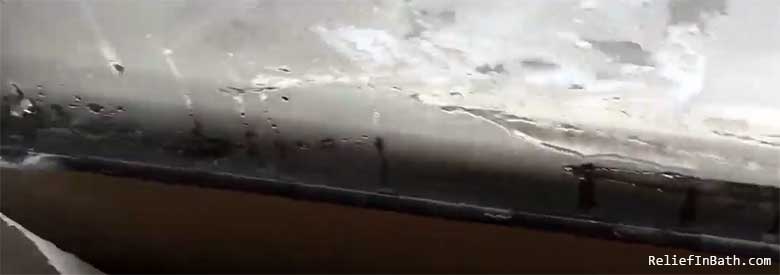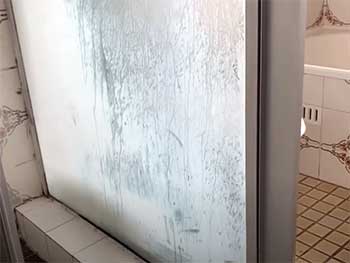Ice on the inside of sliding glass door is such a common problem during the winter season. Even though you keep your sliding glass or window close all the time, ice can still build up inside the sliding glass door.
This causes discomfort as well as some structural problems on your door such as the discoloring of the topcoat of the door, cracking the glass, etc.
If you’re facing a problem and want some permanent solutions, this article is for you.
Reasons Why There Is Ice on Sliding Glass Door Inside

Every modern bathroom has sliding glass doors now. This kind of door has become popular because of its aesthetic look and easy use.
But in winter, these glass doors bring some problems too. The door freezes and lets the ice build up inside the door.
There are some reasons behind this problem. Let’s talk about them –
- Extra Moisture Inside The House
During winter, you may shut every door and window all day long to get rid of the cold air. But have you ever thought that it might cause ice build-up?
When you shut all the doors and windows and keep your thermostat on, it builds humid or extra moisture in the air inside your house. Even when you air dries your clothes, the vapor stays in the home.
Then this moist air condenses in the glass of your window or door and freezes up.
- The Slide Is Colder Than The Dew Point
We all know that when the vapor of the water reaches the dew point, it becomes the liquid form of water. But when the vapor touches something colder than that, it freezes.
That’s what happens with the slide of the glass door. The aluminum slide gets cold in the winter and the temperature of the slide goes below the dew point.
So, when the humid air inside the house condenses in the slide, it turns into ice.
- Air Leakage

Air leakage is one of the common causes that build ice on the inside of the sliding glass door.
The temperature of the window panes can be reduced by air leakage from poorly placed or old windows, creating the ideal conditions for ice to form.
Air leaks and ice development are more common in double-hung, single-hung, and parallel slider windows.
Sometimes there remains a small space between the slide and the wall because of uneven caulking. Air can also come inside through that space.
- Faulty window/door seal
Double or triple-pane glasses need window seals. The window seal prevents the air from coming inside the house.
Another reason that window seal is used is that the space between the panes is filled with argon gas and the window seal locks the gas from coming out.
If the seal gets damaged or comes out of the door, the excess moisture inside the house will condense between the panes and freeze. You can just use a draft sealer for sliding glass doors if you face this problem.
- Inappropriate Glass
Choosing the right glass for your door or window is very important, especially for winter. There are a lot of options for the glass in the market such as single pane, double pane, triple pane, etc.
But every kind of glass is not appropriate for freezing weather.
Double pane glass is the best choice for your house if you want to keep the frost away from the sliding door. This type of glass keeps the heat inside during winter because of the extra layer of the glass.
Single pane glasses cannot keep the heat effectively, and that’s why the frost builds up inside the sliding glass door.
How To Fix This Ice Problem?

We have discussed some probable reasons for ice inside the sliding glass door. Now you might be thinking about how to solve this problem. Here are some easy techniques for you to solve this problem on your own-
- Use A Towel
Place a dry towel in front of the door. This will soak away any extra water dripping from the door and prevent ice formation on the glass. Every night, change the moist towel and replace it with a dry one.
But remember, you have to change the wet towel regularly. Otherwise, there is a high chance that bacteria will form on the damp towel and that will cause a bad odor.
- Check for the leaks
As I said earlier, the most common cause of ice building up inside the sliding glass is the leak. Leaks on the window/door slide allow the air to form the ice inside the glass.
So if you see that there is ice inside your sliding glass door, check for the leaks first.
You can easily find the leaks with a simple fun technique. Light up a candle and move the candle slowly in front of your door. If the flame moves, there’s a leak in your sliding glass.
- Prevent The Moisture Of The Air
The extra moisture inside your house can cause ice build-up. So you have to reduce the excess moisture from the air.
First of all, don’t air-dry the clothes inside your house. This releases a lot of extra moisture in the house.
Then check all the appliances in your kitchen, especially the water heater. A dysfunctional water heater can release moisture into the air.
- Keep The Thermostat On
Some high-functioning thermostats sometimes automatically lower the room temperature at night to save energy. It’s obviously good, but it can cause ice build-up inside your sliding door.
So turn up the temperature before going to sleep to prevent frost on the sliding glass.
- Seal The Sliding Glass Door
This is another common reason for ice build-up inside the sliding glass door. Having an old or faulty sealer can easily let the air come in. But you might be thinking about how to seal sliding glass doors by yourself. It’s really easy.
First, you have to find a suitable sealer for your sliding glass door. Then unscrew the header and remove the old seal. Cut the new seal and just install it.
You can use lubricant for the extra smoothness of your slide.
- Install insulated glass doors
The main purpose of insulated sliding doors or insulated glass doors is to keep the house warm by preventing heat loss through the door. Insulated glass is also called double glazing glass.
So if you want to keep your sliding glass door free from the ice, invest in insulated sliding glasses.
- Caulking
Caulking is a kind of sealing technique. If you find any gap between your sliding door and wall, caulking can be the easiest technique to solve it.
A ‘rope caulk’ can be a better option for giving extra protection over your previous caulk. Because it looks nice and great for the cold weather.
You can also remove this caulk once the winter is gone. That’s how you can prevent the air from entering and forming the ice.
Frequently Asked Questions (FAQ)
It’s called moisture condensation when you have moisture inside of your windows or glass door. It happens when humid and warm air contact the cold surface.
Your sliding glass door may freeze due to the frozen runoff in its tracks. It may also happen due to the excess condensation on the glass as well.
Use a door opener to increase pressure on the frozen sliding glass door. With increased pressure, the door will break through the ice.
Final Words
In order to stay comfortably in the house in winter, you need to stop the ice from forming. First, you have to find out the reason for the ice build-up inside your sliding glass door.
Then go through the solutions we’ve discussed above and identify which method you should use to solve this problem.
All of the techniques are very easy, and you will be able to apply these all by yourself without getting any professional help.
Best of luck with your troubleshooting attempt!
